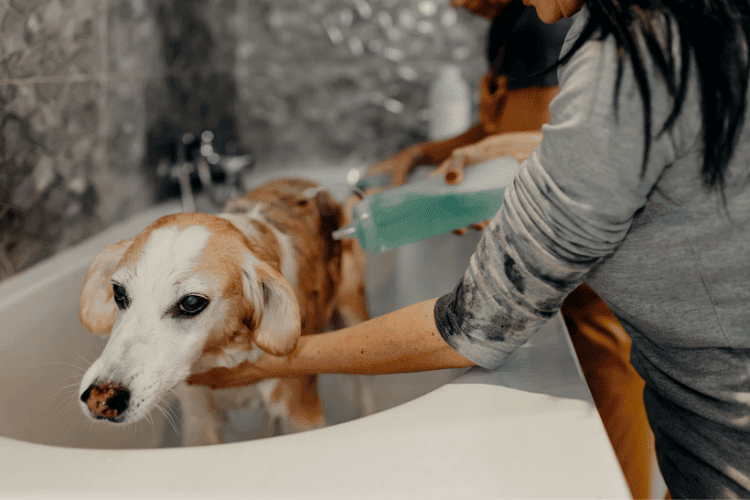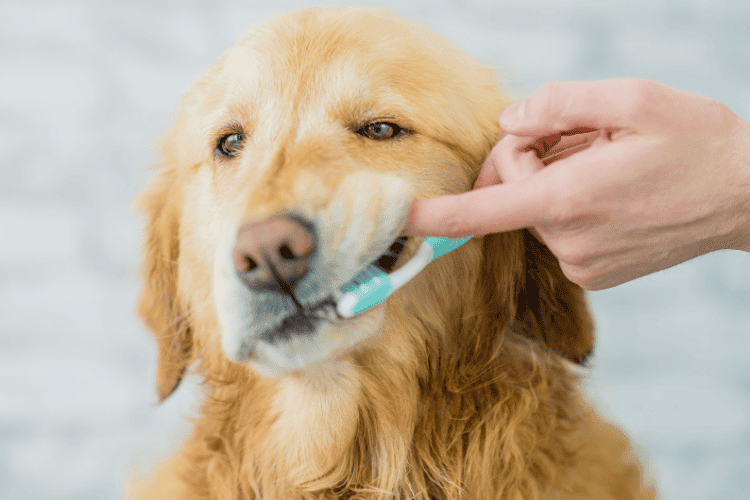If you’ve noticed an unusual fishy smell coming from your beloved furry friend, you may be wondering what could be causing it. While dogs can have their own distinct odour, a dog smelling like fish is typically not normal and may indicate an underlying issue. In this blog post, we will explore seven possible reasons why your dog may be smelling like fish and provide potential solutions to address each cause.
Anal Gland Problems:
Dogs have anal glands located near their anus, which produce a distinct scent. However, when these glands become impacted or infected, they can emit a strong fishy odour. Dogs with anal gland issues may display behaviours such as scooting their bottoms on the ground or excessively licking the area.
Solution: If you suspect anal gland problems and your dog smelling like fish, it is crucial to seek veterinary assistance. A veterinarian can manually express the glands, relieving any blockages or infections. They may also recommend dietary changes or supplementation to promote healthy anal gland function.
Poor Hygiene reasons for a dog smelling like fish:

One of the most common reasons for a dog smelling like fish is poor hygiene. Dogs, especially those with long or dense fur, can accumulate dirt, debris, and even urine or faecal matter in their coat. If not properly cleaned, these substances can lead to an unpleasant odour resembling fish.
Solution: Regular grooming is essential for maintaining your dog’s cleanliness. Brushing your dog’s coat helps remove dirt and prevents matting. Additionally, bathing your dog with a gentle, dog-specific shampoo can eliminate odours. Ensure thorough drying after the bath to prevent moisture from contributing to the smell.
Urinary Tract Infections (UTIs):
Urinary tract infections are another potential cause of a dog smelling like fish. UTIs occur when bacteria enter and multiply in the urinary tract, leading to an unpleasant odour. Dogs with UTIs may exhibit symptoms such as increased urination, straining, or blood in the urine.
Solution: Consult your veterinarian if you suspect a UTI. They will perform a urinalysis to confirm the infection and prescribe appropriate antibiotics to combat the bacteria causing the UTI. Encouraging your dog to drink plenty of water can also help flush out bacteria and prevent future UTIs.
Yeast Infections reasons for a dog smelling like fish:
Yeast infections can affect skin and ears, leading to a dog smelling like fish. These infections are often accompanied by symptoms such as itching, redness, and discharge.
Solution: A veterinarian can diagnose and provide treatment options for yeast infections. This may include antifungal medications, topical treatments, or changes in diet to reduce yeast growth.
Skin Infections:
Skin infections, such as bacterial or fungal infections, can contribute to a dog smelling like fish. These infections often occur in areas with folds or excessive moisture, such as the paws, armpits, or skin folds.
Solution: A veterinarian can examine your dog and prescribe appropriate medications, such as antibiotics or antifungal treatments, to address the skin infection. Regular cleaning and drying of problem areas may also be recommended.
Dental Issues Reasons for a Dog Smelling Like Fish:
Poor dental hygiene and dental disease can cause a dog to smell like fish. Tartar buildup, gum disease, or infected teeth can result in an unpleasant odour.
Solution: Regular dental care is crucial for your dog’s oral health. Brush your dog’s teeth regularly with a dog-specific toothbrush and toothpaste recommended by your veterinarian. Professional dental cleanings may be necessary for more severe cases.

Diet and Digestive Issues:
Dietary factors can significantly impact your dog’s body odour. Certain foods, particularly those containing fish or fish-based ingredients, can contribute to a fishy smell. Additionally, digestive problems or food intolerances can alter the gastrointestinal flora, leading to odorous byproducts.
Solution: Evaluate your dog’s diet and consider switching to a different brand or type of dog smelling like fish-based options are causing the smell. Opt for high-quality, balanced dog foods that suit your dog’s specific needs. When introducing dietary changes, do so gradually to prevent stomach upset. If digestive issues persist or worsen, it is advisable to consult your veterinarian for further evaluation and guidance.
Moreover, you can check our detailed blog on Healthy Dinner Ideas Your Dog Can Eat with You for further assistance in this regard.
Hormonal Imbalances:
Hormonal imbalances, such as those associated with hypothyroidism, can alter your dog’s body odour, resulting in a dog smelling like fish.
Solution: Consult your veterinarian to evaluate your dog’s hormonal levels and discuss potential treatment options, which may include hormone replacement therapy.
Allergies:

Allergic reactions, including food allergies or environmental allergies, can cause skin inflammation and secondary infections, leading to a dog smelling like fish.
Solution: Consult your veterinarian to determine the allergen and develop a suitable management plan, which may involve dietary changes, allergy testing, or medications to relieve symptoms and reduce odour.
Seborrhea Leading to a Dog Smelling Like Fish:
Seborrhea, a skin condition characterized by excessive oiliness or dryness, can result in an unpleasant dog smelling like fish.
Solution: Consult your veterinarian for a proper diagnosis. Treatment may involve medicated shampoos, topical medications, or dietary modifications to manage seborrhea and minimize odour.
Metabolic Disorders:
Certain metabolic disorders can cause a change in your dog smelling like fish.
Solution: Consult your veterinarian for a thorough evaluation and appropriate diagnostic tests. Treatment will depend on the specific disorder and may involve medications, dietary changes, or other interventions.
Kidney or Liver Disease:
Kidney or liver disease can lead to metabolic imbalances that alter your dog’s body odour, resulting in a fishy smell.
Solution: Seek veterinary attention for a comprehensive evaluation of your dog’s kidney and liver function. Treatment options will depend on the specific diagnosis and may involve medication, dietary adjustments, or supportive care.
Reproductive Issues:
Reproductive problems, such as uterine infection or testicular tumours, can reasons of a dog to smell like fish.
Solution: Consult your veterinarian for an examination and appropriate diagnostic tests. Treatment will depend on the specific reproductive issue and may involve surgery, medications, or other interventions.
Diabetes Leading to a Dog Smelling Like Fish:
Diabetic dogs may have a distinct odour due to metabolic changes and increased ketone production.
Solution: If you suspect diabetes, seek veterinary attention for proper diagnosis and management. Treatment typically involves insulin therapy, dietary changes, and regular monitoring of blood glucose levels.
Medications or Supplements:
Certain medications or supplements may cause changes in your dog’s body odour, including a fishy smell.
Solution: Consult your veterinarian to determine if any medications or supplements your dog is taking could be contributing to the odour. Your veterinarian may adjust the dosage or recommend alternative options.

Underlying Health Conditions:
Other underlying health conditions not mentioned above could potentially contribute to a dog smelling like fish
Solution: If the fishy smell persists or is accompanied by other concerning symptoms, consult your veterinarian for a thorough examination. They will perform the necessary tests to identify any underlying health conditions and develop an appropriate treatment plan.
Discovering that your dog smells like fish can be worrisome, but by considering these possible reasons and implementing the suggested solutions, you can take proactive steps to address the issue. Remember, each dog is unique, so it’s essential to consult your veterinarian for a proper diagnosis and tailored treatment plan. With patience, care, and professional guidance, you can help your furry friend overcome the fishy odour and restore their natural freshness.


